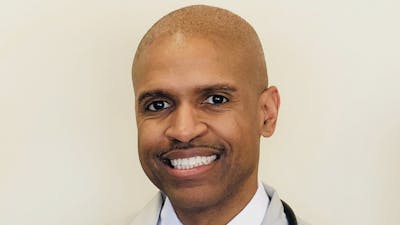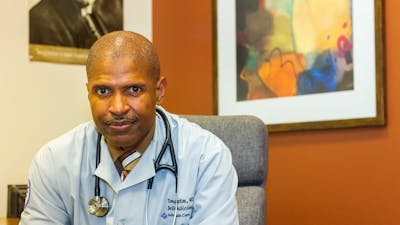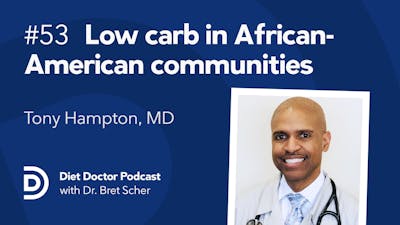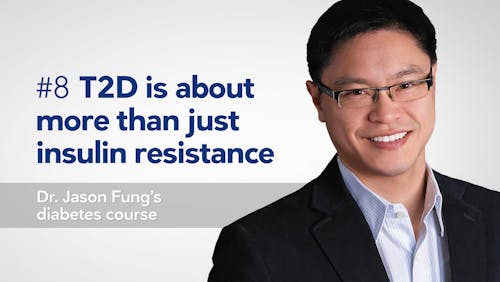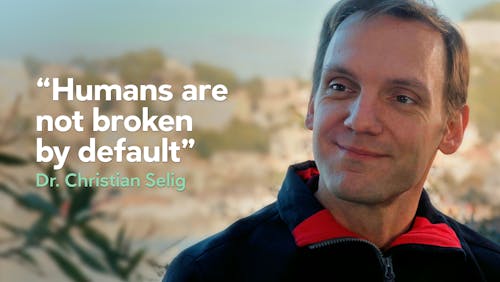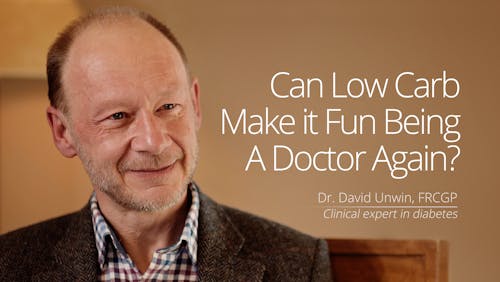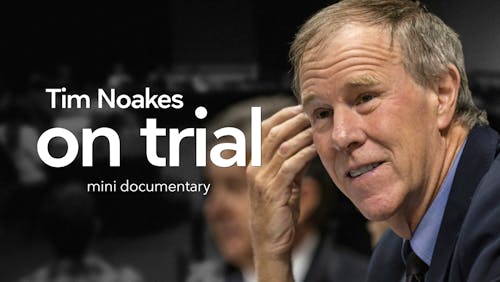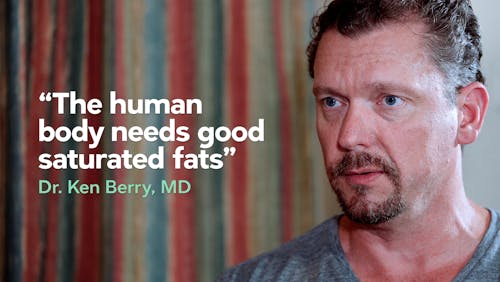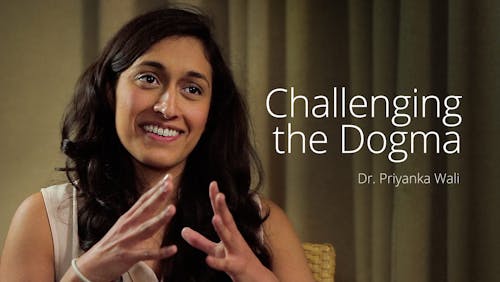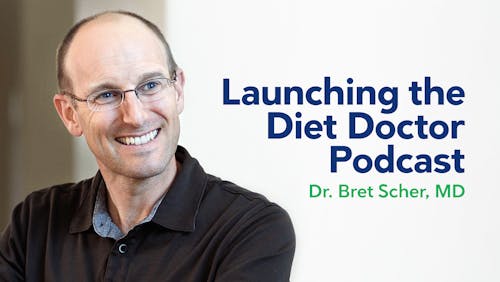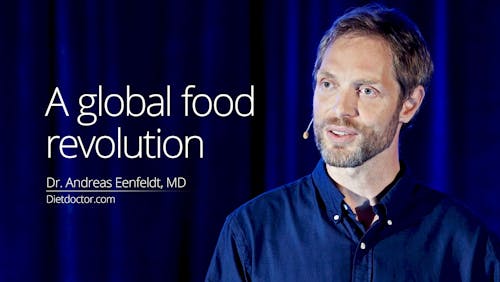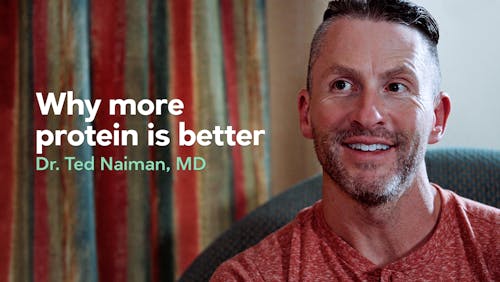Dr. Hampton: Trauma impacts health, wellness – and obesity
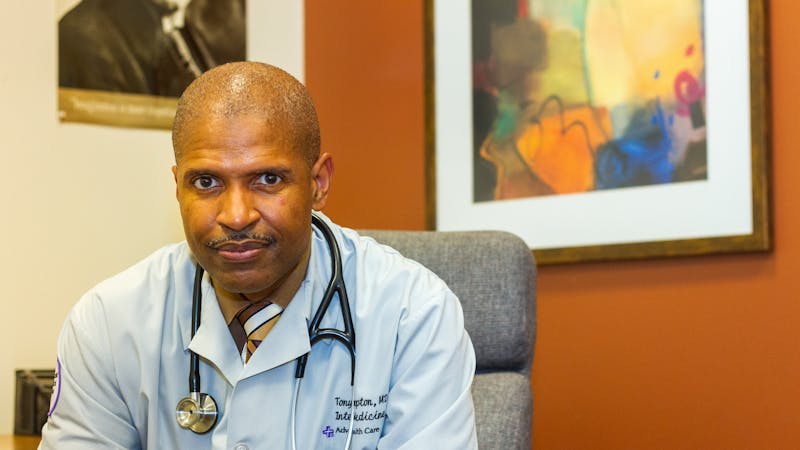
Dr. Tony Hampton is a family physician on the South Side of Chicago. He is writing a monthly column for Diet Doctor. This is his seventh column.
For those who have been reading my Diet Doctor column each month, you’ll know that I’m all about focusing on the root causes of disease and poor health.
That’s why my N.E.S.T acronym focuses on Nutrition, Exercise, Sleep/Stress, and Trauma/Thoughts.
I’ve written so far about tips for low-carb eating, exercising , getting a good night’s sleep , and dealing effectively with stress — all of which are the foundations of good health.
But imagine how much harder this is to if you have experienced, or are still experiencing, trauma in your life?
This column is going to explore, a little bit, what we know about the impact of trauma on your health and wellness — and, yes, even your weight and metabolic health. And, more importantly, what you can do to help heal from past traumas and deal with ongoing trauma.This is a big and important topic, which I can only touch on here. I hope, however, to provide enough information and support to help you, if you have experienced trauma, to seek out the help you may need.
What is trauma?
What do we mean when we use the word “trauma”?
In medicine, we use the word “trauma” to describe an injury. But in psychology, it means experiencing something deeply disturbing or distressing. The American Psychiatric Association defines trauma as an emotional response to a terrible event.
Many of us have traumatic experiences in our past, whether or not we express or acknowledge them.
This past year of the pandemic has been, for millions, a traumatic experience — a deeply disturbing or distressing ongoing event.We do know that many people have been suffering loneliness due to physical distancing. A recent study found loneliness as high as 43% among those 18 to 35. The mental health impact is escalating both pure financial costs, as well as, in thoughts of self-harm and suicide.
The impact has been the greatest for those who were already struggling, only to have now lost jobs or social supports when the pandemic arose. A moving and important recent article in The New York Times notes, the “virus seized upon America’s inequality and hugely magnified it.”
The true traumatic aftermath of the pandemic, especially on our children, may only reveal itself in the years ahead.
Single and cumulative impacts
We often think of trauma in our minds as a single terrible experience, like a natural disaster, fire, sexual assault, bad accident, or being the witness or victim of violence.
But trauma can accumulate. We all know about the common occurrence of the veteran who returns home from a war with PTSD (post-traumatic stress disorder). It is often not one single event in the war, but the ongoing duration of unrelieved and unprocessed distressing events, which accumulates to create the lingering PTSD responses.
One of the most important research findings in public health of the past three decades is about the cumulative impact of negative events in our life, especially in childhood and youth.
Many research studies now show that adverse childhood experiences (called ACEs) impact one’s life course, creating strong risk factors for future ill health, chronic diseases, addictions, behavioral issues — and yes, even obesity and difficulty losing weight.Impact of past trauma first revealed in an obesity clinic
The story of how the impact of ACES was discovered is fascinating. You can read the full history here. But I will give a short synopsis.
It all started in 1985 at a Kaiser Permanente obesity clinic in San Diego when Dr. Vincent Felitti, head of the department of preventive medicine, was trying to figure out why 50% of the patients dropped out of the program, even if they were achieving some success at losing weight.
In-depth interviews with more than 280 former patients revealed a startling finding: About 50% had a history of childhood trauma, particularly sexual abuse.
The diet or weight loss process for some triggered a stress response and discomfort, linking back to that past trauma, which was so uncomfortable that the patients withdrew. Somehow, over the years, either using food as a comfort, or the obesity itself, had shielded them from the anxiety and ongoing stress from that past trauma.When Dr. Felitti presented the findings in 1990, at a national obesity conference, no one believed him. (Some doctors even said that the patients’ stories “were fabrications to provide a cover for their failed lives.”)
However, a researcher at the Center for Disease Control was intrigued. In partnership with Felitti, they set up a study with access to the entire Kaiser Permanente general patient database. They were able to interview more than 17,421 patients between 1995 and 1997. They reported first on their findings in a 1998 publication. Now those patients have been followed for two decades.
Since that time, many more studies have now linked childhood trauma, and high ACE scores, with higher rates of obesity and other chronic health issues in adulthood.
Getting an ACE score
The ACEs studies focused on ten types of childhood trauma: sexual, physical and verbal abuse; types of family dysfunction (alcoholic or mentally ill parent, witnessing domestic violence, a parent in jail, loss of a parent through death, divorce or abandonment); and emotional or physical neglect.
You can take online tests to get your ACEs score. Researchers have found that the more ACEs you report as an adult, the higher the association with heart disease, diabetes, obesity, mental health conditions, substance abuse, and more.
(Since the initial studies, others have added other traumatic criteria, such as homelessness, racism, poverty, natural disasters, community violence, even bullying, and other negative family, social, or societal interactions.)
In short, all trauma counts, not just the official ACE score. But note, positive childhood experiences also count and are protective. A loving and reliable adult and other positive social supports can foster resilience and protect at-risk children from negative ACE outcomes.Neurobiology of trauma
Why is acute or past trauma so impactful?
Research is ongoing, but so far, it shows trauma fundamentally alters our physical and neurological biology, leading to overactive stress responses.
It can keep stress hormones constantly high, or raise blood pressure. It encodes in our immune systems and can trigger epigenetic action, which is the expression of certain genes through our behavior and environments.
Additionally, the need to self-soothe the ongoing fear, anxiety, and distress may lead to coping strategies that are helpful in the short term but prove detrimental over time.
For example, when we have constant surges of cortisol, we may have more cravings for processed foods, sweet, salty, sugary stuff, because it releases dopamine and dopamine makes us happy.
A stressed brain often seeks dopamine via food, alcohol, or drugs to help us feel better in the moment but may contribute to future struggles with weight, mental health, or substance abuse.All of this focus on trauma’s impacts is very timely. Recently, popular books by trauma specialists have delved more deeply into all of these issues.
Two of them, in the past month, have topped the bestseller lists. The Body Keeps the Score, by trauma psychiatrist Dr. Bessel van der Kolk, is described as essential reading for “anyone interested in understanding and treating traumatic stress and the scope of its impact on society.”
Just this spring, Oprah Winfrey and Neuroscientist and Trauma Expert Dr. Bruce Perry co-wrote and released What Happened to you?, which is described as a series of conversations that allows us to understand our traumatic pasts in order to open the door to resilience and healing.
Recently, on my podcast #48 , I had a fascinating discussion with Chicago trauma expert Victoria Smoter, who is the clinical lead psychologist for the Advocate Trauma Recovery Center, which is right across from my office.
What struck me most in my hour-long talk with Smoter is her compassionate and positive assurance that those who have been impacted by trauma can heal and thrive, especially if given respect and connection that re-builds a sense of safety and trust.
An important turning point for healing is understanding that “you are not broken or damaged by the trauma,” but rather, your brain and body are wired, through our stress response, to protect you. What helped you survive the trauma at the time is now, however, no longer helping.
So after the trauma, you may have to work on re-wiring your overactive brain or learn techniques to dampen or control that overwhelming stress response.
You can’t change the past, so what can you do?
As a trauma specialist, Smoter describes her role as helping patients achieve acceptance that, yes, something bad happened, and you can’t change that, but you can come to a place “of knowing we have automatic physiological responses when we feel threatened.”
“But there are things that we can do now to slow down our heart rate, to slow down our breathing, to let our brains and bodies know we are more or less safe right now. And you have a choice in how you respond even when things are really scary or overwhelming,” Smoter says.
A key healing step, she says, is to try to stay grounded in the present moment, to not let your mind dwell on the past or project fear scenarios into the future, but to focus on all that is good right now — even if it is something small like the smell of a flower, the taste of a cup of coffee, a walk with a dog or a friend.“Find a couple of nice things, or at least neutral things, today. Practice gratitude, practice patience with yourself, and give yourself some space, some breathing room. Those are the biggest things to mitigate cumulative effects of traumatic stress and chronic stress,” she says.
What can you do? Here are a few actions:
-
Take the ACE test. Find your score. And remember, other traumas are not in it. Think about all the distressing or difficult times in your life, beyond just their 10 criteria, and how they may have impacted you and your behaviors and responses.
What are you still carrying? What still triggers you? What strength and resilience do you have? And what do you do when you feel triggered? Do you, perhaps, try to soothe an emotional wound or distressing feelings with perhaps food or other comforts?
- Don’t suppress it: Talk to people about it, particularly your doctor. As a doctor, I know that some of my male patients are “strong silent types” with tough-guy mentalities, who never share emotionally what is going on with them. Some of the women are non-confrontational or don’t want to upset people by revealing difficult issues.
In order for doctors to help, you have to open up and be honest. Few doctors will ask you about past issues like physical and sexual abuse, but if you share what is going on, they will endeavor to help you and link you to good resources.
- Learn more about it: Read helpful books, like The Body Keeps the Score and What Happened to You? Both explore ways to heal. Some therapies include talk therapy with trauma specialists, breathing exercises, trauma-informed yoga practices, group therapy, and medication management.
Even a form of play therapy can increase a sense of trust and safety for those who missed those experiences as a child. Explore the literature at sites like the CDC’s ACEs site and the advocacy group ACEs Too High.”
- Get a referral: Trauma-informed practice is becoming more common among psychologists and psychiatrists as well as other health professionals. Get a referral to a Trauma Recovery Center (TRC).
In recent years many health organizations and communities have adopted TRC models to help serve survivors of violent crimes, physical and sexual assaults, domestic abuse, and other events that cause physical and psychological harm.
These specialized centers help people to heal and move past the trauma. You can also find certified trauma counselors through associations like the Association of Traumatic Stress Specialists.
If you are a survivor of trauma know that you are not alone and that people are here to help you. Getting the support and treatment you need may enable you to heal and move on.
It may even help you achieve better health and weight loss by addressing what happened to you and how it continues to play out— perhaps hidden even from you — in your life.
Thanks for reading. Until next time, remember to protect your N.E.S.T.
